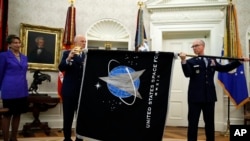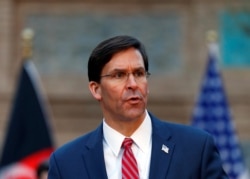Russia continues to pose “serious” and “growing” threats to U.S. interests in space, according to the top military officer for space defense.
“They’re real, they’re serious and they’re concerning,” Gen. John Raymond, chief of the newly established U.S. Space Force and head of U.S. Space Command, told reporters Wednesday.
“Our advantage has been diminished, and that's why the establishment of the Space Force in the Aerospace Command is so important — to allow us to move fast with agility of effort, reducing costs to stay ahead of that growing threat,” he added.
The realm of space is essential to everyday activities from navigation to banking. Space assets are also critical to military missions from launching missiles to collecting intelligence.
Raymond did not elaborate when pressed for specific areas where the U.S. advantage is eroding but touted “significant strides” over recent months to remain the world leader in space.
Raymond credited having the “best partnerships” as a major reason the United States leads in space, confirming that Peru this month became the latest nation to join a U.S.-led network that shares information on space objects.
The data-sharing space situational awareness agreement will give Peru access to satellite tracking data, connecting Peru’s space agency with the military team that tracks space objects for the United States.
Raymond warned, however, that as the United States has watched both Russia and China advance in space capabilities, “any progress they make could erode our advantage.”
Russia and China have recently placed a greater emphasis on their space capabilities, including developing technology and weapons that could disrupt or destroy satellites.
“Our adversaries in the last several years have weaponized space. They’ve made it a war fighting domain,” Secretary of Defense Mark Esper said Friday.
In recent weeks, Russia fired an anti-satellite missile, technology that could threaten U.S. orbital assets. It also conducted test maneuvers of two satellites that followed a U.S. spy satellite, a move that the U.S. Space Force said last month "exhibited characteristics of a space weapon.”
Raymond slammed Russia’s “hypocritical” behavior toward space, saying that Moscow is advocating for outer space arms control at the same time it is developing space weapons.
Iran and North Korea have less developed capabilities than Russia and China, but they still pose a threat, according to defense officials.
Last month, Iran conducted its first successful launch of a military satellite into space. Raymond reiterated to reporters Wednesday that the satellite was “nothing more than a tumbling webcam” that was unlikely to provide intelligence.







